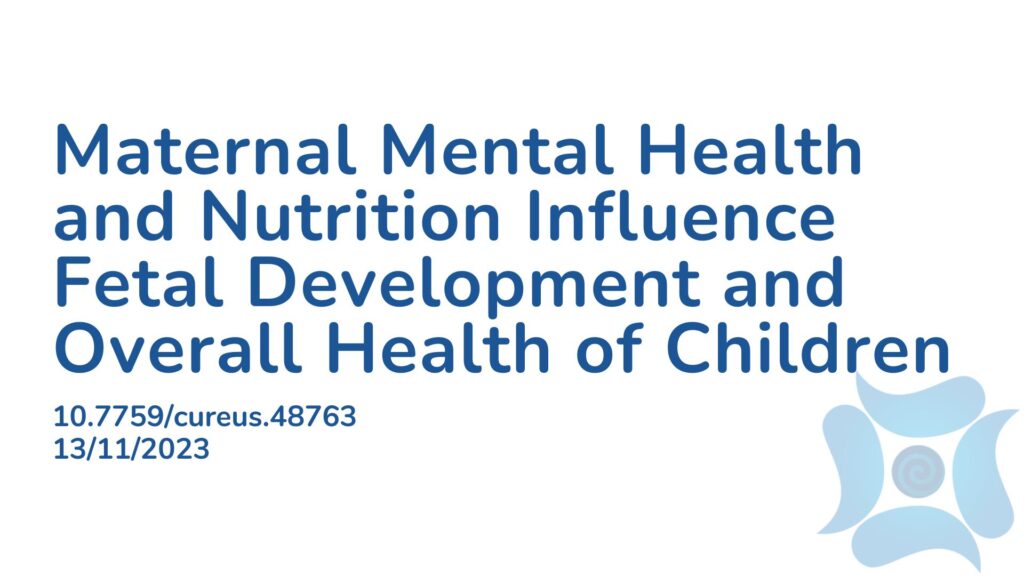Summary:
The preconception and conception period are critical for a child’s future well-being, with maternal nutrition and mental health being key considerations. Adequate intake of essential nutrients such as proteins, carbohydrates, fats, vitamins, and minerals is crucial for fetal development, while deficiencies can lead to developmental delays and chronic conditions like obesity and diabetes. Similarly, maternal mental health issues, such as depression, can adversely affect the baby’s cognitive and behavioral development. High cortisol levels from maternal stress can impair fetal brain development, increasing the risk of behavioral problems and psychiatric disorders. The parent-child bond can also be disrupted, leading to insecure attachment and poor social skills. Prenatal care programs now increasingly include nutritional counseling and mental health support to ensure optimal outcomes for both mother and child. Addressing these factors is vital for improved health outcomes, effective policies, and better future opportunities. This review examines how pregnancy nutrition and mental health impact fetal growth and physical, cognitive, and behavioral health. It shows that a balanced diet with essential nutrients supports fetal organ development, cognitive function, and immune resilience. For example, iron and omega-3 fatty acids are linked to reduced developmental risks and improved cognition. Conversely, maternal malnutrition, whether from undernutrition or excessive weight gain, can lead to outcomes like low birth weight, poor neurodevelopment, and increased risks of chronic diseases later in life. Stress, anxiety, and depression during pregnancy can harm the fetus, increasing the likelihood of cognitive, behavioral, and emotional challenges in the child. Chronic maternal stress exposes the fetus to elevated stress hormones, potentially affecting brain structure and function. Understanding these complexities is key to developing effective interventions and promoting the best outcomes for children. Further research is necessary to establish evidence-based recommendations for maternal care during pregnancy, emphasizing the importance of addressing both physical and mental aspects of maternal health to mitigate poor health outcomes for the child.
Abstract:
Throughout pregnancy, the mother’s nutritional and mental health significantly influences the kid’s long-term growth and wellness. This review’s objective is to provide a comprehensive assessment of the literature on the link between pregnancy nutrition and a sound mind and a foetus’ growth, considering factors in the physical, cognitive, emotional, and social domains. A balanced, nutrient-rich diet is crucial for the baby to grow and develop properly during pregnancy. An appropriate diet of significant macronutrients and micronutrients supports good foetal organ development, cognitive function, and immune system resiliency. For instance, studies have linked iron and omega-3 fatty acids to a reduced risk of developmental delays and improved cognitive performance. Contrarily, malnutrition in mothers, such as undernutrition or excessive weight gain, has been connected with negative results, including low birth weight, poor neurodevelopment, and increased susceptibility to chronic diseases in later life. The mother’s mental health, including emotional equilibrium and psychological stability, significantly impacts the child’s development. Stress, anxiety, and depression experienced by mothers during pregnancy harm the developing foetus and increase the risk of cognitive, behavioural, and emotional difficulties in the offspring. The growing foetus is exposed to high levels of stress hormones due to chronic maternal stress, which might alter the fetus’s brain’s shape and function. Factors influencing child development outcomes include maternal-infant attachment, breastfeeding start and duration, and general caring practices. A comprehensive approach is critical since new research indicates a synergistic relationship between maternal nutrition and mental health. Inadequate nutritional intake might result from maternal mental health problems that interfere with appetite control and eating habits. On the other hand, inadequate maternal nutrition may raise maternal stress and result in mental health problems. Therefore, integrative therapies focusing on both areas are essential to maximise child development results. In conclusion, maternal nutrition and mental health during pregnancy significantly impact a child’s development in various domains. Understanding the complex relationships between maternal nutrition and mental health is necessary to develop effective therapies and promote the most remarkable results for children. Further research is needed to understand better the underlying mechanisms to develop evidence-based recommendations for optimal mother care throughout pregnancy. The need of this review is to know how maternal health, physical or mental affects the child’s development and how we can further prevent it by taking precautions during pregnancy.
Article Publication Date: 13/11/2023
DOI: 10.7759/cureus.48763



